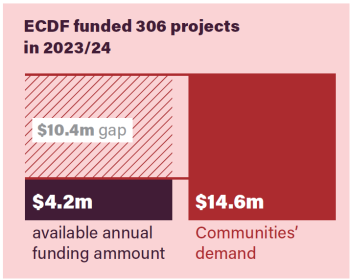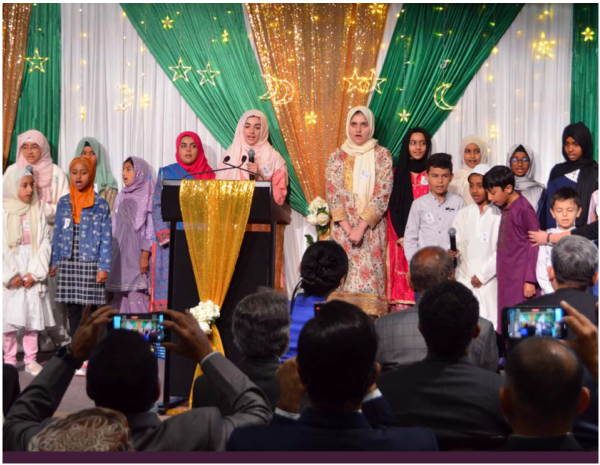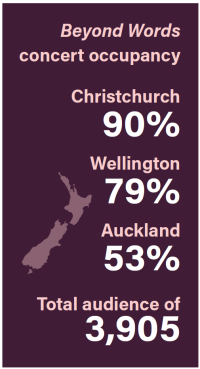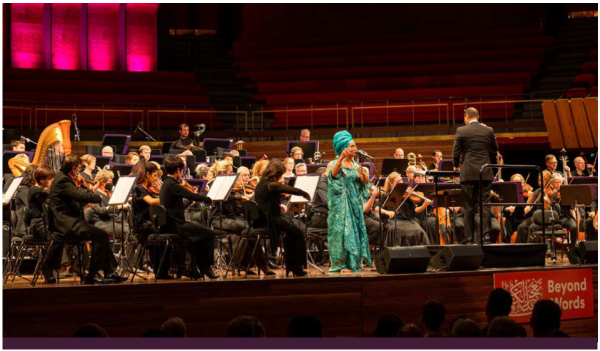Empowered Ethnic Communities via funding support
The Ethnic Communities Development Fund has $4.2 million a year available to support Ethnic Communities in growing their skills, celebrating their culture and participating in society.
The Fund provides accessible, quick funding for one-off projects and initiatives. To be eligible for funding, projects must align with at least one of the Ministry’s strategic priorities, which are:
 Promoting the value of diversity and improving the inclusion of Ethnic Communities in wider society
Promoting the value of diversity and improving the inclusion of Ethnic Communities in wider society- Ensuring government services are provided fairly and are easily accessible for Ethnic Communities
- Improving economic outcomes for Ethnic Communities and looking at the barriers to employment
- Connecting and uplifting Ethnic Community groups.
During the 2023/24 financial year, the ECDF received 583 applications totalling $14.6 million. The $4.2 million of funding was distributed across over 306 projects.
Celebrating community events at Parliament
We delivered the Lunar New Year and Eid Parliamentary events in February and April 2024, hosted by the Hon Melissa Lee, the Minister for Ethnic Communities.
The February event marked the name change to Lunar New Year in recognition of the diverse Asian populations celebrating this significant cultural festival.
The Lunar New Year festivities expanded to embrace several East and Far East Asian traditions, including Chinese, Korean and Vietnamese. Other communities also joined us to learn more about the richness of different cultures. One participant commented, “Thanks for a beautiful event. I loved Pokarekare Ana played soulfully on the traditional Chinese musical instrument.”

Lunar New Year celebration at Parliament, February 2024.
At Eid in Parliament, guests from diverse communities mingled and shared stories. From recitations of the Quran to poetry to children enchanting Nasheed and inspiring speeches by faith leaders, the event was a true celebration of culture and faith.
Organising these community events at Parliament reaffirms our commitment to fostering understanding, respect and unity in New Zealand.

Group photo of the children ‘Nasheed’ at the Eid at Parliament event.
 ‘Beyond Words’ concert series marking the fifth remembrance of March 15
‘Beyond Words’ concert series marking the fifth remembrance of March 15
Marking the fifth remembrance of the Christchurch Mosque terrorist attacks of 15 March 2019, we partnered with the New Zealand Symphony Orchestra Te Tira Pūoro o Aotearoa, the Central Iqra Trust and Muslim communities nationwide to present the ‘Beyond Words’ concert series.
With support from our ECDF, the concerts and community engagement events attracted thousands of participants across Christchurch, Wellington and Auckland.
The concerts garnered significant attendance, with over 90 percent occupancy in Christchurch, 79 percent in Wellington, and 53 percent in Auckland, totalling an audience of 3,905. Also, community engagement events attracted over a thousand participants across the three cities.
‘Beyond Words’ is an example of the transformative power of art in creating understanding, healing wounds and uniting
communities in the face of adversity. The feedback from organisers, participants and audience members alike has been
positive, with praise for the concert’s emotional resonance, cultural significance and message of unity.

The New Zealand Symphony Orchestra’s ‘Beyond Words’ concert in Wellington.
Case study four - Promoting social cohesion and wellbeing amidst the Israel/Palestine conflict
Our objective
To support affected Ethnic Communities in New Zealand by fostering social cohesion, understanding and wellbeing in response to the humanitarian crisis resulting from the Israel/Palestine conflict.
What we did
In November 2023, we established a dedicated team, as a one-off initiative, to support community-led initiatives promoting stronger social bonds for affected Ethnic Communities in New Zealand. This programme was not to discuss the conflict happening in Israel and Palestine but was about encouraging social co-hesion for these ethnic communities within New Zealand. Our efforts included:
Engaging with impacted communities:
- Created safe spaces for dialogue and support among Muslim and Jewish communities.
- Hosted wellbeing workshops tailored to Kiwi-Muslim women.
- Held an interfaith meeting with faith leaders, including Muslim and Jewish, in collaboration with the Religious Diversity Centre.
Facilitating discussions:
- Brokered and attended discussions between the Kiwi-Jewish and Palestinian communities and respective government agencies, such as the Department of Prime Minister and Cabinet and the Ministry of Business, Innovation and Employment, to address specific needs related to the Gaza situation.
Leveraging the ECDF:
- Expedited funding for projects aimed at promoting unity and understanding.
What was the result
The positive feedback and tangible outcomes of our initiatives underscore the importance of our continued support to ensure a cohesive and harmonious New Zealand for all.
Key ECDF-supported initiatives included:
Awareness campaigns:
Funded the Asturlab Cultural Centre’s three-month digital campaign to raise awareness about the humanitarian situation in Gaza, engaging 5,000 to 10,000 New Zealanders.
Wellbeing workshops:
Conducted workshops, particularly for women, providing crucial support and connection, with participants expressing gratitude for the safe spaces created.
Educational content creation:
Supported the Jewish Museum of New Zealand in developing online content about Jewish culture and history, reaching thousands and raising awareness to combat antisemitism.
What this means for all New Zealanders, including our Ethnic Communities
Strengthening social cohesion in New Zealand through community-led efforts promotes peace, understanding, and a more resilient, united society.
In times of conflict, creating counter-hate narratives and establishing safe spaces for our New Zealand communities to voice their concerns is crucial. The Ministry’s initiatives ensure all New Zealanders feel included, valued and heard.
Faith Leaders Hui
In line with our commitment to promoting unity, inclusion and social cohesion among Ethnic and Faith-based Communities, we convened two Faith Leaders Forums in Auckland in August 2023 and February 2024.
The forums aimed to establish a space where all involved parties could work collectively and to form a sustainable relationship among leaders, based on transparency, trust and mutual respect.
These forums built on previous work the Ministry, and former Office, have done to connect faith leaders, such as the Connecting Faith | Interfaith Communities Hui in 2020.
The inaugural forum featured a Lecture by Professor Paul Morris from Victoria University of Wellington on Diversities and Religions: Aotearoa in the Past Decade.
At the second forum, faith leaders met the Hon Melissa Lee, the Minister for Ethnic Communities. They also heard from John Price ONZM, Director of Civil Defence Emergency Management, NEMA.
The way forward
Te ara whakamua
As we look ahead to the upcoming year, we will focus on building the advocacy and resilience capabilities of ethnic New Zealanders, empowering them to participate actively in society.
We will also prioritise supporting improved economic outcomes for our Ethnic Communities and businesses and boosting their contributions to New Zealand’s social and economic fabric.
We will continue with our Security and Resilience work programme, which aims to enhance the wellbeing and resilience of our Ethnic Communities in an ever-changing world.
We are excited about the positive changes we can collectively make and look forward to a truly inclusive future.
Statement of Responsibility
Te tauākī noho haepapa
I am responsible as Chief Executive of the Ministry for Ethnic Communities (Te Tari Mātāwaka) for the accuracy of any end-of-year performance information prepared by the Ministry, whether or not that information is included in the Annual Report.
In my opinion, the Annual Report fairly reflects the operations, progress and organisational health and capability of the Ministry for Ethnic Communities.
Mervin Singham
Chief Executive
Ministry for Ethnic Communities – Te Tari Mātāwaka
30 September 2024
